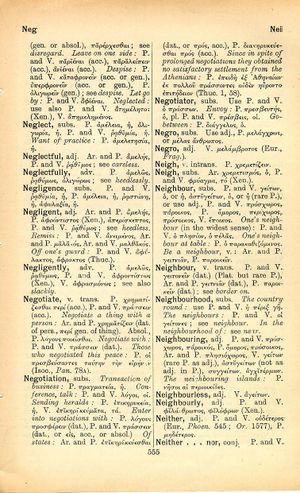neighbour: Difference between revisions
From LSJ
ξένος ὢν ἀκολούθει τοῖς ἐπιχωρίοις νόμοις → as a foreigner, follow the laws of that country | when in Rome, do as the Romans do
mNo edit summary |
m (Woodhouse1 replacement) |
||
| Line 1: | Line 1: | ||
{{Woodhouse1 | {{Woodhouse1 | ||
|Text=[[File:woodhouse_555.jpg|thumb|link={{filepath:woodhouse_555.jpg}}]] | |Text=[[File:woodhouse_555.jpg|thumb|link={{filepath:woodhouse_555.jpg}}]] | ||
===substantive=== | |||
P. and V. [[γείτων]], ὁ, or ἡ. [[ἀστυγείτων]], ὁ, or ἡ (rare P.). or use adj., P. and V. [[πρόσχωρος]], [[πάροικος]]. P. [[ὅμορος]], [[περίχωρος]], [[πρόσοικος]]. V. [[ἔποικος]]. | [[prose|P.]] and [[verse|V.]] [[γείτων]], ὁ, or ἡ. [[ἀστυγείτων]], ὁ, or ἡ (rare [[prose|P.]]). or use adj., [[prose|P.]] and [[verse|V.]] [[πρόσχωρος]], [[πάροικος]]. [[prose|P.]] [[ὅμορος]], [[περίχωρος]], [[πρόσοικος]]. [[verse|V.]] [[ἔποικος]]. | ||
[[one's neighbour]] (in the widest sense): P. and V. ὁ πλησίον, | [[one's neighbour]] (in the widest sense): [[prose|P.]] and [[verse|V.]] [[ὁ πλησίον]], [[ὁ πέλας]]. | ||
[[one's neighbour at table]]: P | [[one's neighbour at table]]: [[prose|P.]] [[ὁ παρακαθιζόμενος]]. | ||
[[be a neighbour]] v.:Ar. and P. γειτνιᾶν, P. παροικεῖν. | [[be a neighbour]] v.:[[Aristophanes|Ar.]] and [[prose|P.]] [[γειτνιᾶν]], [[prose|P.]] [[παροικεῖν]]. | ||
===verb transitive=== | |||
P. and V. γειτονεῖν (dat.) ( | [[prose|P.]] and [[verse|V.]] [[γειτονεῖν]]; (dat.) ([[Plato]] but rare [[prose|P.]]). [[Aristophanes|Ar.]] and [[prose|P.]] [[γειτνιᾶν]] (dat.). [[prose|P.]] [[παροικεῖν]] (dat.); see [[border on]]. | ||
}} | }} | ||
Revision as of 09:16, 20 May 2020
English > Greek (Woodhouse)
substantive
P. and V. γείτων, ὁ, or ἡ. ἀστυγείτων, ὁ, or ἡ (rare P.). or use adj., P. and V. πρόσχωρος, πάροικος. P. ὅμορος, περίχωρος, πρόσοικος. V. ἔποικος.
one's neighbour (in the widest sense): P. and V. ὁ πλησίον, ὁ πέλας.
one's neighbour at table: P. ὁ παρακαθιζόμενος.
be a neighbour v.:Ar. and P. γειτνιᾶν, P. παροικεῖν.
verb transitive
P. and V. γειτονεῖν; (dat.) (Plato but rare P.). Ar. and P. γειτνιᾶν (dat.). P. παροικεῖν (dat.); see border on.

